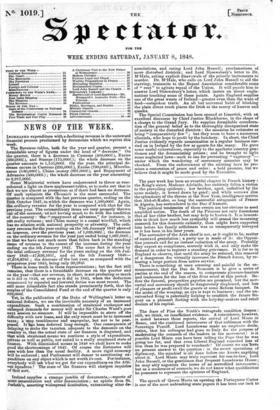NEWS OF THE WEEK.
INCREASED expenditure with a declining revenue is the untoward financial process proclaimed by documents which we reprint this week.
The Revenue-tables, both for the year and quarter, present a formidable array of figures under the bead of " decrease." On the quarter, there is a decrease in Customs (400,0001.), Excise (360,0000, and Stamps (175,0000; the whole decrease on the quarter amounts to 1,15:3,000/. On the year, the principal de- crease occurs in Customs (295,0000, Excise (790,0001.), Miscella- neous (130,0000, China money (607,0001.), and Repayment of Advances (500,0000 ; the whole decrease on the year amounting to 2,217,000/.
Some Ministerial writers have endeavoured to throw so rose- coloured a light on these unpleasant tables, as to make out that in fact weare almost as prosperous as if there had been no decrease. Of such optimists the Chronicle is the most successful. The quarter is compared with the last previous quarter, ending on the 10th October 1847, in which the decrease was 1,500,000/. Again, the ordinary revenue for the year is compared with that for the previous year. The extraordinary items are very properly thrown out of the account, as not having much to do with the condition of the country : the "repayment of advances," for instance, is not really revenue; and China money is a casual windfall, which has no relation with national prosperity or adversity. The ordi- nary revenue for the year ending on the 5th January 1847 showed an increase, over the previous year, of 1,028,000/.; the decrease on the ordinary revenue for the year just ended being 1,067,000/.; so that we have not much more than fallen back in the standing items of revenue to the extent of the increase during the year ending on the 5th January 1847. The same fact is shown by the total ordinary revenue for the years ending on the 5th Jan- uary 1846-47,656,161/., and on the 5th January 1848— 47,616,878/. ; the decrease of the last year, as compared with the prosperous year 1845, being only 39,283/.
There is some truth in these representations ; but the fact still remains, that there is a formidable decrease on the quarter and on the year—that our revenue, in short, is not producing so much as it did in 1840, or even as it did in 1845, when the deduction occasioned by repealed and lowered duties was most recent. The still more formidable fact also stands prominently forth, that the surplus of the Consolidated Fund at the end of the quarter is only 852,000/.
Yet, in the publication of the Duke of Wellington's letter on national defence, we see the inevitable necessity of an increased expenditure. Such a combination of straitened exchequer and enlarged demands for money will make Sir Charles Wood's post next session no sinecure. It will be impossible to stave off the difficulty with new loans, and the only resort must be to increased taxes; a step troublesome and unpopular, but not to be post- poned. It hes been deferred long enough. One consequence of delaying to make the taxation adequate to the demands on the country is, that the actual state of our finances is disguised, and that with straitened means we continue a style of expenditure, private as well as public, not suited to a really straitened state of finance. With diminished means in 1848 we shall have to make good the shortcomings of 1847. Of course the Estimates will pass with leas than the usual facility. A more rigid economy will be enforced ; and Parliament will demur to sanctioning ex- penditure on any object which is not worth its cost. For instance, everybody will ask what we get for our expenditure on the Afri- can squadron ? The state of the finances will sharpen inquiries of that sort.


























